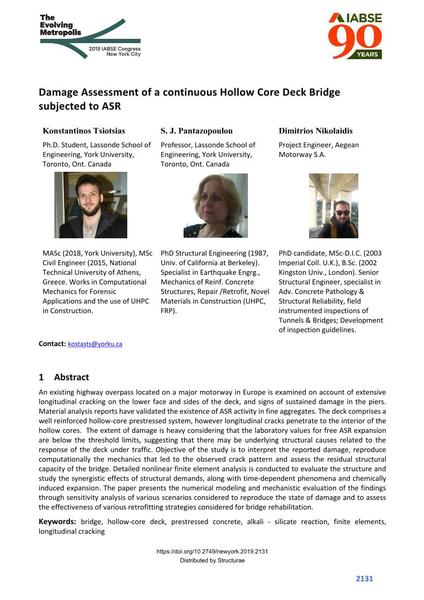Damage Assessment of a continuous Hollow Core Deck Bridge subjected to ASR

|
|
|||||||||||
Détails bibliographiques
| Auteur(s): |
Konstantinos Tsiotsias
(Lassonde School of Engineering, York University, Toronto, Ontario, Canada)
S. J. Pantazopoulou (Lassonde School of Engineering, York University, Toronto, Ontario, Canada) Dimitrios Nikolaidis (Aegean Motorway S.A.) |
||||
|---|---|---|---|---|---|
| Médium: | papier de conférence | ||||
| Langue(s): | anglais | ||||
| Conférence: | IABSE Congress: The Evolving Metropolis, New York, NY, USA, 4-6 September 2019 | ||||
| Publié dans: | The Evolving Metropolis | ||||
|
|||||
| Page(s): | 2131-2135 | ||||
| Nombre total de pages (du PDF): | 5 | ||||
| DOI: | 10.2749/newyork.2019.2131 | ||||
| Abstrait: |
An existing highway overpass located on a major motorway in Europe is examined on account of extensive longitudinal cracking on the lower face and sides of the deck, and signs of sustained damage in the piers. Material analysis reports have validated the existence of ASR activity in fine aggregates. The deck comprises a well reinforced hollow-core prestressed system, however longitudinal cracks penetrate to the interior of the hollow cores. The extent of damage is heavy considering that the laboratory values for free ASR expansion are below the threshold limits, suggesting that there may be underlying structural causes related to the response of the deck under traffic. Objective of the study is to interpret the reported damage, reproduce computationally the mechanics that led to the observed crack pattern and assess the residual structural capacity of the bridge. Detailed nonlinear finite element analysis is conducted to evaluate the structure and study the synergistic effects of structural demands, along with time-dependent phenomena and chemically induced expansion. The paper presents the numerical modeling and mechanistic evaluation of the findings through sensitivity analysis of various scenarios considered to reproduce the state of damage and to assess the effectiveness of various retrofitting strategies considered for bridge rehabilitation. |
||||
| Mots-clé: |
pont
|
||||
